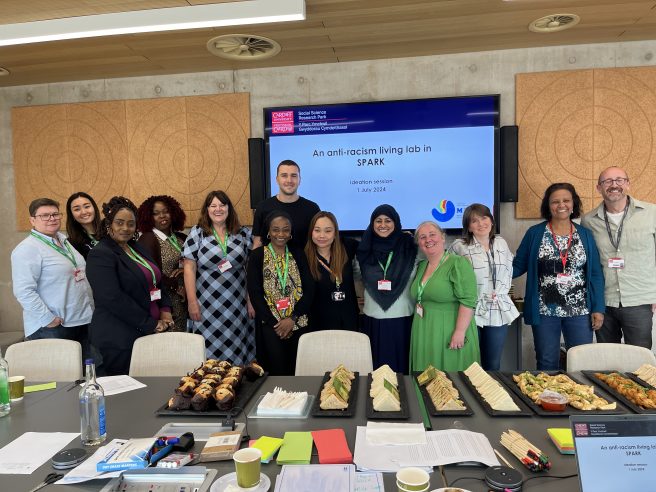A new living lab for an anti-racist university
11 September 2024
On 1 July 2024, a group with diverse expertise and a commitment to antiracism kick-started ideation on a new Cardiff University living lab.
Convened together by SPARK (the Social Science Research Park) and MEAD (the Migration, Ethnicity, Race and Diversity Research Group) this group included University researchers, professional services staff and doctoral students with representatives from the Welsh Government and three partner organisations, EYST (based in SPARK), BAWSO and Race Council Cymru. Supported by an award from the University’s Research Culture Fund, the session provided an initial opportunity to explore a living lab on anti-racism in SPARK.
This ideation session built on relationships established through previous SPARK/MEAD collaborations, including an event showcasing the University’s policy-relevant research on ethnicity in November 2023.
Living labs are defined and understood in different ways in the tertiary education sector, but in essence connect an institution’s academic activity (research, teaching and learning) with non-academic partners, including internal university professional services and external businesses, Third Sector organisations, public bodies, and community groups, to develop solutions to a ‘real world’ problem in a ‘real life’ setting. Living labs are ‘in their nature collaborative’ (Higgins and Klein, 2011).
Cardiff University’s evolving new Strategy to 2035 commits to using ‘…our university as a ‘living lab’ to co-define our challenges and work together on solutions.’ There are numerous University-based and other living labs across the UK and Europe (for example, see the European Network of Living Labs) with oft-mentioned benefits including their ‘open’ nature and focus on co-creation, strong transformational potential to address complex challenges, ability to redefine the student learning experience and creation of rich, real-world research and knowledge transfer opportunities for academics. These do not, however, include a living lab focused on antiracism.
The Big Conversation on Cardiff University’s future and our emerging Strategy recognise that ‘the current model for universities is no longer fit for purpose’. There is an urgent need to tackle the ‘legacy systems and cultures’ that are embedded in our institution through becoming an ‘anti-racist university’. This is fundamental to the kind of university that we should – and want to – be.
Professor Emmanuel Ogbonna from the University’s Business School and Ronald Roberts remind us that anti-racism builds on but goes beyond a commitment to Equality, Diversity and Inclusion (EDI):
‘Equality of opportunity seeks to ensure that individuals are given an equal opportunity to take part or ‘compete’ via processes that treat everyone fairly or similarly. Managed diversity describes deliberate actions to promote the inclusion of people from different backgrounds. Anti-racism goes beyond these two approaches by explicitly and consciously taking action to resist and tackle systemic and institutional racism.’ (Roberts, 2021: 2)
This is an imperative for Cardiff University, and for all Welsh Higher Education institutions and public bodies, long driven by lived experience of embedded inequalities and discrimination and more recently framed by the Welsh Government’s Action Plan towards an anti-racist Wales’. Our Provost and Deputy Vice-Chancellor, Professor Damian Walford Davies, speaks to this urgent imperative and the contribution that a living lab on antiracism might make: ‘We are committed to making Cardiff University an anti-racist institution and this is one of our non-negotiables. Anti-racism is embedded both in our new institutional strategy and in our next Strategic Equality Plan. Achieving this aim requires us to do things differently, and this is exactly what this new ‘living lab’ will help us achieve. The knowledge we gain from this initiative will support other institutions across Wales and the world to take important strides forward in the journey to become actively anti-racist. This new initiative is a prime example of Cardiff University co-creating new knowledge to deliver a better world for future generations.’
From our ideation session, we have begun to map out what a living lab on anti-racism might focus on, including the four ‘core’ components of our university, i.e., research, teaching and education, institutional practices and civic engagement. We have also begun discussion on how a living lab might itself be anti-racist, in its creation and design, its nature and operation. This is an important exploration and discussion to have to ensure that what we do and how we do it works in a way that is congruent with anti-racist practice.
Thank you to everyone who has participated so far in ideation around the Antiracism Living Lab – this is a collective effort from across our University and from our community partners’ as we are in the early stages of developing the lab / it’s an ongoing collaboration.
Professor Sin Yi Cheung, SocSi
Uzo Iwobi, Race Council Cymru
Princess Onyeanusi, Race Council Cymru
Wanjiku Mbugua, BAWSO
Anaer Yeerjiang, doctoral student (SocSi)
Kemba Hadaway-Morgan, doctoral student (SocSi)
Usha Ladwa-Thomas, Welsh Government and Innovator in Residence for SPARK
Heledd Jenkins, Equality Disparity Unit, Welsh Government
Venice Cowper (EDI Hub)
Shabnam Ali (EDI Hub)
Professor Chris Taylor, SPARK
Dr Anna Skeels, SPARK
Dr Hayley Trowbridge, SPARK
Selima Bahadur (EYST)
Dr Sofia Vougioukalou (CARE)
Noam Devey, Organisational and Staff Development
Professor Helen Williams, Teaching and Learning Academy
Our next steps include an internal working group session, a focus on living lab design, incorporating the living lab into the University’s Strategic Equality Plan’s Year One Action Plan and developing our resourcing strategy, including proposals for funding already identified.